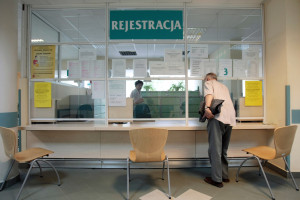Can patients be punished for uncancelled visits? Commentary by former vice-president of the National Health Fund

- Should a patient who does not show up for a visit or does not cancel it pay a fine? This postulate appeared in a citizens' petition addressed to the Ministry of Health
- We asked Bernard Waśko, director of the National Institute of Public Health - National Institute of Hygiene and former vice-president of the National Health Fund, whether this is realistic and fair.
- The most important thing is to build awareness and responsibility. We all chip in to finance the treatment - the expert replies
- Yes and no - says Bernard Waśko, asked about the possibility of penalizing patients for not canceling visits. - In facilities that have the appropriate tools - such as text messages, online systems or applications that allow you to cancel your visit without any problems - you can consider some kind of responsibility for the patient who does not come and does not inform about it.
In his opinion, penalties cannot be introduced if the patient does not have a real possibility of convenient contact with the facility. However, where modern tools are available, the topic of some kind of shared responsibility is worth taking up. - In the private sector, the consequences of not canceling an appointment are the norm and patients generally accept them. Why should it be any different in the public health care system?
A public visit also costs money– A visit, even a “free” one, costs money: you have to pay for the doctor’s time, for the office, for the clinic’s infrastructure – says Waśko. He points out that if a patient does not come and does not cancel the visit, someone else waiting in line cannot use it. This is a waste of public funds.
Therefore, according to the expert, a conversation about patients’ shared responsibility is necessary – although, of course, within reasonable limits.
To point out that currently, to reach the clinic, not only to make an appointment, but also to cancel an appointment, can be very long. Which demotivates even those responsible patients - the head of the National Health Fund "AP-Kolce" system has been operating for some time in selected specialist clinics, which allows for monitoring queues and sending text messages reminding about the appointment. - This is the first step. Reminder text messages are sent, but - it is true - two-way communication is still missing - i.e. the possibility of canceling or confirming an appointment via text message, application or hotline - admits Bernard Waśko.
The former president of the National Health Fund emphasizes that a system that will facilitate the cancellation of visits is being designed.
– Intensive work is underway on central patient registration, carried out by the e-Health Centre – says Waśko. – Ultimately, it will be possible to cancel appointments via the IKP application, website or by phone – within one central hotline.
This solution is intended to be a response to current problems – e.g. difficulties in calling many facilities.
Financial penalty? Or maybe something elseIs the financial penalty proposed by the citizens as "50 PLN" a good idea?
– Leaving aside all other aspects, it would be difficult to enforce – replies Waśko. – In theory, it is possible, but we would probably need some kind of prepayment system when registering, which is currently unfeasible. Other mechanisms are more realistic: for example, losing your place in the queue if someone does not cancel their visit. But even this must be designed very carefully so as not to deprive anyone of health benefits.
Or maybe an SMS with information about costs ? – Building awareness that a visit costs money – even if the patient does not pay for it directly – is a good direction. Maybe the information itself will be enough: “Your visit costs the system PLN 200 – confirm or cancel”. This is a signal that would certainly help build awareness.
The expert emphasizes that this is not about punishing for the sake of it . It is about maturity and civic solidarity. - It is important to build awareness and joint responsibility of citizens for the fact that they receive some benefit in the public system, which is not for free. That someone pays for it from the budget, to which "we all chip in" - it is worth people knowing about it. And the more such signals, the more we will build a conscious and mature civic attitude.
"Tools first, requirements second"Finally, Waśko makes the matter clear:
Today there are no penalties for not canceling a visit. The suggestions come from the patients themselves– First, patients need to be given real tools – easy, accessible and intuitive. Only then can we talk about shared responsibility. Otherwise, it would be not only ineffective, but also unfair.
Recall: in 2023, the National Health Fund recorded approximately 1.3 million uncancelled visits, which means a significant increase compared to previous years. This situation generates increasing financial losses, contributes to the creation of artificial queues and extends the waiting time for visits for other patients.
In response to this problem, the citizen submitted a petition to the Ministry of Health, in which he proposed specific solutions in the form of financial penalties. Among the proposals was a registration fee of PLN 50, which would be returned to the patient after the visit. Another option would be to introduce a deposit fee for not canceling the visit: PLN 50 for the first time and PLN 100 for the second incident.
The author also proposed that the registration fee increase for subsequent uncancelled visits to a given service provider or to all facilities via the P1 system (PLN 50 for the first time, PLN 100 for the second). The petition also included a suggestion that the management of the service provider could notify law enforcement agencies of the possibility of committing a crime under Article 160 of the Penal Code in the event of a visit not being carried out without notification.
Currently, the issue of missed medical appointments is not regulated in a way that would provide for financial penalties: the Healthcare Services Act only requires the patient to immediately notify the facility of the inability to appear. The only consequence of a patient not showing up is being moved to the end of the waiting list. Despite these proposals, the Ministry of Health has no plans to introduce fees for missed appointments, arguing that this would potentially have a negative impact on people in difficult financial situations and the risk of limiting access to services.
Copyrighted material - reprint rules are specified in the regulations .
rynekzdrowia
















